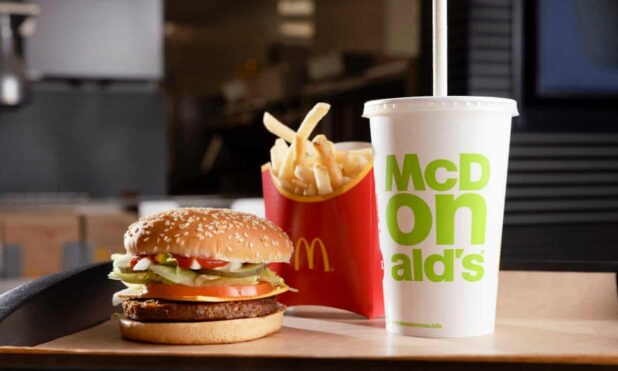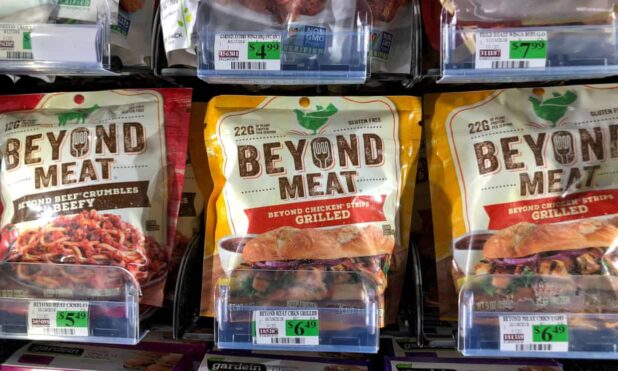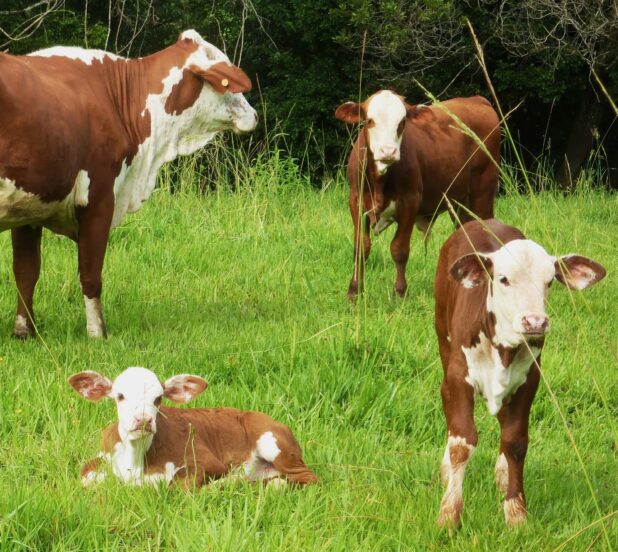So, the theory was that people would go to McDonald’s and then buy a non-meat burger because they believe that eating that will stop hurricanes and earthquakes?
That was the thinking?
At the start of the year, McDonald’s launched a plant-based burger “sizzled on a flat-iron grill, then topped with slivered onions, tangy pickles, crisp shredded lettuce, Roma tomato slices, ketchup, mustard, mayo and a slice of melty American cheese”. For a while, it looked like a glimpse of the future.
The US test run of the McPlant burger was quietly shelved last month (it is still available in some markets, including the UK) in one of a series of setbacks for a meatless-meat industry that only a year ago was claiming it could change the great American menu for ever.
Getting meat eaters in the US to adopt plant-based alternatives has proven a challenge. Beyond Meat, which produces a variety of plant-based products, including imitations of ground beef, burgers, sausages, meatballs and jerky, has had a rough 12 months, with its stock dipping nearly 70%.
Multiple chains that partnered with the company, including McDonald’s, have quietly ended trial launches. In August, the company laid off 4% of its workforce after a slowdown in sales growth. Last week, its chief operating officer was reportedly arrested for biting another man on the nose during a road rage confrontation.
It’s a dramatic reversal of fortune. Just two years ago, Beyond Meat, its competitor Impossible Foods and the plant-based meat industry at large seemed poised to start a food revolution.
After nearly a decade of development, plant-based meat started hitting the mainstream in 2018. Grocery stores started selling Beyond Meat ground beef and sausages, while more restaurants were offering plant-based meat on their menus. Burger King announced the launch of the Impossible Whopper, while other fast-food chains came out with similar launches, like a plant-based breakfast sausage sandwich at Dunkin’ and meatless pepperoni pizza at Pizza Hut.
For a time, Wall Street went vegetarian. In 2019 Beyond Meat was valued at over $10bn (£8.9bn), more than Macy’s or Xerox. The most bullish investors believed that plant-based meat would make up 15% of all meat sales by 2030. But the reality of Americans’ interest in plant-based meat has proven more complicated than investors thought, and the adoption of meat alternatives has been slower than what was once hoped. Today Beyond Meat is valued at just over $900m (£799m).
The sobering story is similar to those experienced by many new ventures that see exhilarating hype after a flood of Silicon Valley venture capital cash, fueled by excitement about innovation. Bill Gates backed Beyond Meat, and a number of venture capital firms that typically invest in tech startups funneled money to startups making plant-based meat. Even the meat industry’s biggest players have, ironically, invested in companies coming up with plant-based meat.
“The bulls in the industry, I think, had a very wild, very optimistic estimate of how big the market could get,” said John Baumgartner, an analyst at Mizuho Securities. “There was a lot of exuberance in this category. It was new, it was different, it was on trend.
“But the consumer environment is tough, and this stuff is not cheap,” he added. “It’s going to take time to change cultural practices. It’s not going to happen overnight.”
The noble cow is the perfect food production machinery. There is no other technology capable of turning grass into meat and milk.
If you observe the body shape of a cow, it becomes obvious that they were designed to be eaten. Their legs are tiny in relation to the rest of their body, and are clearly there just to support their voluptuous, meaty torso.
Trying to come up with ways to imitate meat to avoid using cows is like trying to create artificial wombs and sex robots to avoid the rightful enslavement of women.
It’s against nature.
Maybe this scam would have worked better 10 years ago when people were still trying to claim that “meat is not healthy,” but that entire project was abandoned in full. As far as I’m aware, there is no one other than extremely fringe lunatics claiming that meat is unhealthy – beef in particular is now celebrated by experts as the ideal food, possibly excluding fish.
So you have to get people to accept that they will eat something that is not only less tasty but also less healthy – on the theory that eating it will stop natural disasters.
That’s a big ask.
 Daily Stormer The Most Censored Publication in History
Daily Stormer The Most Censored Publication in History







